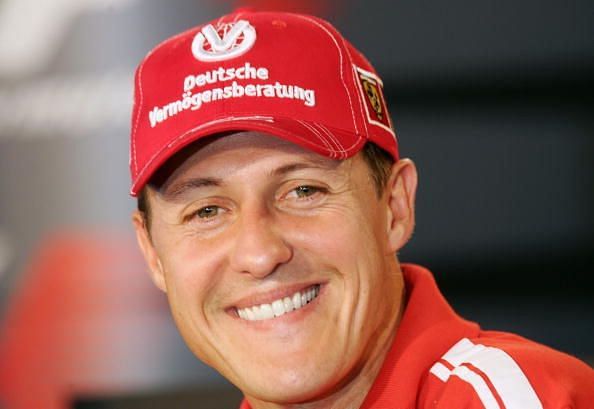Michael Schumacher has triumphed at the German Grand Prix more times than any other driver since the race was included as a part of the Formula One World Championship.
The German Grand Prix has shuffled between two venues, Nürburgring in Rhineland-Palatinate, Hockenheimring in Baden-Württemberg, and included a one-off event at AVUS in Berlin. Although the seven-time world champion has raced at the Nürburgring as well as Hockenheimring, the German has triumphed only at German Grands Prix held at the latter.
Formula One would be revisiting Germany after a one-year interval due to disagreement about commercial terms between circuit owners and the F1 management. 2018 would be the 63rd time that the race would be a part of the championship.
While Michael has 91 Formula One wins under his belt, let us relieve the four that came during the German Grand Prix in chronological order:
#1 1995 German Grand Prix
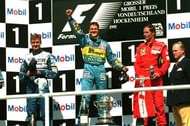
After 3 prior attempts at the German Grand Prix, Schumacher had two podium finishes to show for his efforts. It was in 1995 that Michael became the first German to claim the top step at his home Formula One Grand Prix.
The then Benetton driver started the race on the first row behind Damon Hill, while his teammate, Johnny Herbert, started down in 9th. Damon was able to make an impeccable start, pulling away from the German in the opening lap.
Unfortunately for Hill, his Williams skid into the gravel trap, effectively putting an end to his race due to a collision with the tyre wall. The retirement dropped the lead in Michael’s hands, letting him speed off, away from the rest of the group.
The German’s lead was so significant over second-placed David Coulthard that he managed a two-stop strategy while his immediate rivals implemented a one-stop and still remained in the front.
It was later revealed that a problematic driveshaft in Damon’s Williams had caused the accident which relinquished the lead to Michael. Merely nine drivers finished the race, out of the 24 that had started. Benetton was the only team that managed to get both their drivers to reach the chequered flag.
#2 2002 German Grand Prix
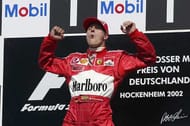
2002 saw a redesigned Hockenheimring host the German Grand Prix. The circuit was drastically shortened to 4.574 km.
Michael Schumacher had arrived at the event in 2002, already a five-time world champion. He had clinched his fifth title during the previous race at France after securing 8 wins from 12 races. He had finished all the other races on the podium and was looking to emulate his performances at the Hockenheimring.
The Red Baron was yet to secure a victory at his home Grand Prix with Ferrari and he had the winner’s trophy within his sights. The German had a promising start to the weekend, when he qualified on pole.
The entirety of the race saw the two Schumacher brothers fighting for the lead, but unfortunately for Ralf, who had started on the front row with Michael, traffic and ignored blue flags put a dent in his challenge. Jarno Trulli received a drive-through penalty, but it couldn’t do anything for Ralf.
The younger Schumacher attempted an overcut on his brother, but the endeavour was unsuccessful. Later on, Ralf had to run to the pits for a third time due to air running out in his Williams’ pneumatic system, dropping him behind the second-placed Juan Pablo Montoya and helping Michael claim victory.
#3 2004 German Grand Prix
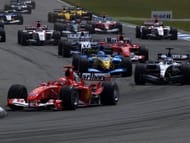
2004 was the year that Michael won his seventh and last World Championship title. It was a year dominated by the German, who triumphed at 13 different circuits out of the 18 races that were held.
The Grand Prix began with Michael on pole and Juan Pablo Montoya behind him in his Williams. Although Jenson Button had qualified third, he suffered a 10 place grid penalty due to an engine change during practice on Friday. The Williams was slow to pull away at the start and allowed the Ferrari driver to gain a substantial advantage.
Jenson cut through the field from back in 13th, and running a longer stint on his initial set of tyres, he ended the race in second place ahead of Fernando Alonso. This was despite a helmet issue which resulted from a loose strap. He had to hold the helmet in place with one hand to stop it from cutting off his air flow.
Kimi Räikkönen retired with a collapsed rear wing. Both the Renault drivers, Alonso and Jarno Trulli, as well as David Coulthard who finished in fourth, caught debris under their cars, effectively hampering their race.
Michael, meanwhile, had a relatively incident-free race, ultimately encountering the chequered flag a good eight second before anyone else.
#4 2006 German Grand Prix
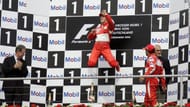
Kimi Räikkönen started the race on pole in front of the two Ferrari cars of Michael Schumacher and Felipe Massa. However, Kimi’s McLaren had been filled with an insufficient amount of fuel which was indeed going to hurt his chances during the Grand Prix.
While the McLaren pulled away with the two Ferrari drivers trailing him, he naturally ran out of fuel and had to make an exceptionally early pit stop. Probably in accordance with Murphy’s Law, the day was not going as planned for the Finn. An excruciatingly slow pit stop later, the McLaren rejoined in eight and was left in no position to fight for the win.
Räikkönen made three pit stops in total and it was a wonder that he still finished the race on the podium.
The honour of a one-two, though, went to Ferrari. Despite a few guarded attempts at overtaking, Massa, subsequently, fell back to allow the German to finish the Grand Prix on the top step. Ultimately, Schumacher finished less than a second before the Brazilian and secured his third last Formula One career win.
